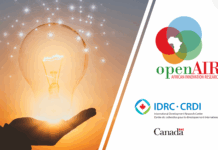By Akkila Thirukesan
This blog is part one of a series into Akkila’s during her visit to Open AIR’s South Africa hub – the IP Unit at the University of Cape Town (UCT). Akkila is conducting research into Intellectual Property (IP) and Gender.
Sustainable Development Goal #5 has propelled a global movement to empower women and girls around the world in every avenue possible, including in the area of IP and innovation. The desire to empower women through these avenues is often plagued with unconscious assumptions about how the knowledge and innovation in the global North can be implemented in the Global South. Challenging these assumptions is the primary focus of my time here in Cape Town, as well as researching the intersection of IP and gender and while working with our partner hub, the IP Unit at UCT.
Questioning My Research Questions
I initially came to Cape Town to answer the question of how IP and innovation empower women. Within my first week of meeting scholars and colleagues at the IP Unit, my question has now become – can IP and Innovation empower women? Specifically, African women?
The majority of the research on IP and gender, already slim in substance, fails in this intersectional approach. Gender is defined as male or female, with the automatic assumption that a gender analysis is a focus on women, and not the broader scope of how different classes of women and even men, are affected differently.
I had the pleasure of meeting Dr. Laura Foster, a scholar who has frequently worked with the Open AIR network, and had a long conversation on this subject. Open AIR has already discussed in our briefing note on IP and gender that IP laws are assumed to be gender neutral, when in fact they fail to account for the nuances of “gendered” IP engagement. In addition, as Dr. Foster and I discussed in detail, the general analysis of IP and gender focuses on a limited binary that can exclude those who do not fit in.
My doubts were expanded even more with my conversation with Dr. Tobias Schonwetter, Director of the IP Unit at UCT and Open AIR Steering Committee member. We discussed the importance of acknowledging the uniqueness of South Africa’s IP system and the importance of challenging the assumptions that developed country norms of IP are even workable in the South African – and perhaps even African – context.
The Added Dimensions of Experiential Learning
As a JD/MA student, I find that my master’s side challenges my assumptions about the way legal systems operate, while my legal side attempts to find solutions to a lot of the social problems that exist around the world. Yet the holistic perspective only gained through travelling and seeing how societies operate in practice, is not always captured in the literature and data that we attempt to base our understanding and knowledge from. Looking back on my first week, I have felt my understanding of South Africa’s complex history deepen, and yet, I am mindful of the fact that I still have so much more to learn. Being in a new context, shows me some of the complexities that are not captured in the literature. I am truly grateful for these insights, that I would not have gained if it wasn’t for my trip to Cape Town. I am excited to be further challenged in my assumptions and understandings of this beautiful country.









